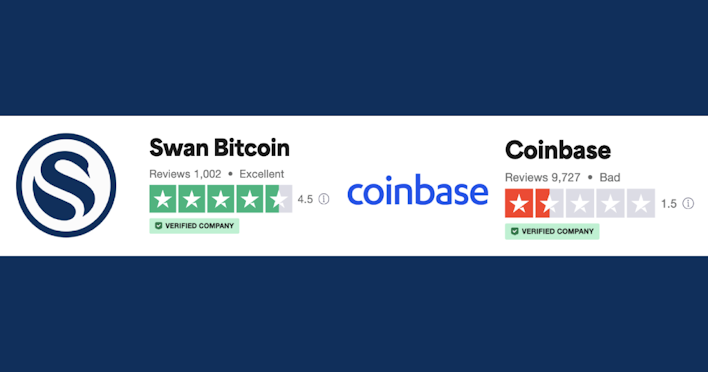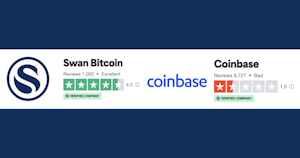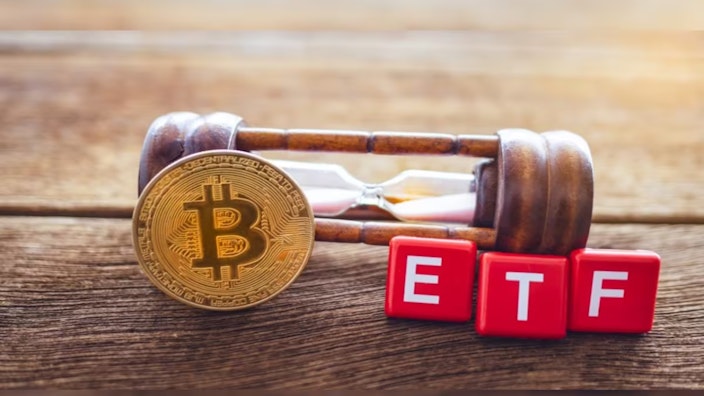MSTR vs. GBTC Compared: Which is Best in 2024?
This article compares MSTR and GBTC, offering insights for investors by examining their features, benefits, performance, fees, and drawbacks, focusing on their role in Bitcoin investment strategies.

MSTR leverages Bitcoin as its primary reserve asset and offers the potential for significant appreciation. Its diversified investment and enterprise software operations approach provides a more stable investment profile compared to the singular focus of GBTC on Bitcoin’s price fluctuations.
Find out why below! You can jump to any section below by clicking on the jumplink…
MicroStrategy (MSTR) stands out for its substantial Bitcoin investments, positioning it as THE trailblazer among publicly traded companies adopting Bitcoin as its primary treasury asset. MSTR provides a proxy for investors seeking Bitcoin exposure without direct cryptocurrency investment.
Meanwhile, the Grayscale Bitcoin Trust (GBTC) tempts investors with direct exposure to Bitcoin’s price movements. But here’s the twist — what if I told you that neither MSTR nor GBTC is your best bet?
MicroStrategy is a prominent company that has pivoted its focus towards Bitcoin-only investment.
Originally established as a provider of business intelligence, mobile software, and cloud-based services, MSTR has shifted its corporate strategy to add real Bitcoin to its corporate balance sheet as its primary reserve asset.
This strategic move has provided a first-mover advantage and positioned MSTR as a unique blend of a traditional software company and a cryptocurrency investment vehicle.
Structure: MSTR is a NASDAQ-listed company uniquely invested in Bitcoin and Bitcoin-only as its primary treasury asset. This direct investment approach sets it apart from other digital asset investment vehicles.
Investment Focus: MSTR’s primary investment focus is Bitcoin, which is held in its corporate treasury. It reflects its strong belief in the digital currency’s long-term value and growth potential.
Fees: As a public company, MSTR doesn’t have typical investment fees like management or performance charges. However, investors should consider its stock price, exchange trading fees, and any premium or discount on the stock relative to its Bitcoin holdings.
Performance: MSTR’s stock price is closely linked to Bitcoin’s volatile price movements, leading to significant fluctuations. Its performance should be assessed considering both its software business and Bitcoin investments.
The Grayscale Bitcoin Trust (GBTC) offers investors a traditional investment vehicle to gain exposure to Bitcoin’s price movements without the challenges of buying, storing, and safekeeping Bitcoins directly.
Structure: GBTC is a trust, not an ETF. It trades over the counter (OTC) and doesn’t offer the same liquidity as owning stock in a publicly traded company.
Investment Focus: Like MSTR, GBTC holds actual Bitcoin, offering more direct exposure to Bitcoin’s price.
Performance: GBTC’s price can deviate significantly from the underlying Bitcoin price, often trading at a premium or discount.
Fees: The annual fee for GBTC is the highest of all 11 approved spot Bitcoin ETFs.
Current Spot Bitcoin ETF fees as of February 26th, 2024
Grayscale: The Grayscale Bitcoin Trust (GBTC) fee is 1.5% — the fund holds 502,713 BTC with Coinbase.
BlackRock: iShares Bitcoin Trust (IBIT) fee is 0.25% fees for the first 6 months (or $5 billion) — the fund holds 52,026 BTC with Coinbase.
Fidelity: Wise Origin Bitcoin Trust (FBTC) fee is 0.25% (with 0% fees until July 31, 2024) — holds 46,238 BTC in self-custody.
Ark/21 Shares: Ark/21 Shares Bitcoin Trust (ARKB) fee is 0.21% (0% fees for first 6 months or $1 Billion) — holds 14,390 BTC with Coinbase.
Bitwise: Bitwise Bitcoin ETF (BITB) fee is 0.20% (0% fees for first 6 months or $1 billion) — holds 13,576 BTC with Coinbase.
Invesco: Invesco Galaxy Bitcoin ETF (BTCO) fee is 0.25% (0% fees for first 6 months or $5 billion) — holds 6,864 BTC wth Coinbase.
VanEck: The VanEck Bitcoin Trust (HODL) fee is 0.20% of the fund — holds 2,885 BTC with Gemini.
Valkyrie: Valkyrie Bitcoin Fund (BRRR) fee is 0.49% (0% fees for first 3 months) — holds 2,635 BTC with Coinbase.
Franklin Templeton: Franklin Bitcoin ETF (EZBC) fee is 0.19% — holds 1,363 BTC with Coinbase.
WisdomTree: WisdomTree Bitcoin Trust (BTCW) fee is 0.30% (0% fees for first 6 months or $1 Billion) — holds 201 BTC with Coinbase.
Want to known more about spot Bitcoin ETF fees? Check out our complete overview.
Direct Exposure to Bitcoin = Increase in MSTR Stock Price
MSTR often mirrors Bitcoin’s market performance due to its substantial investment in the cryptocurrency. When Bitcoin’s value increases, so does the value of MicroStrategy’s holdings, positively affecting MSTR’s stock price.
Since MSTR first invested in Bitcoin on August 11th, 2020 — its stock has gained approximately 466.52% from its starting price of $141.99 to today’s price of $799.32.
Investment Structure
MicroStrategy’s direct Bitcoin investment, part of its corporate treasury, allows investors to gain cryptocurrency market exposure through its publicly traded stock MSTR, bypassing the need for direct dealings with cryptocurrency exchanges or wallets.
Lower Fees
Investing in MSTR, a publicly traded company, offers indirect exposure to Bitcoin, avoiding the usual fees for buying, holding, and selling Bitcoin directly.
This approach eliminates typical transaction and management costs associated with buying real Bitcoin.
Regulated Framework
MSTR operates under U.S. regulations for publicly traded companies, offering investors security and transparency. This compliance ensures proper corporate governance and financial reporting, creating a safer and more structured investment environment.
Cons
Market Volatility
MSTR’s heavy reliance on Bitcoin makes its stock susceptible to the inherent volatility of the Bitcoin market.
Bitcoin’s price can be extremely volatile, influenced by regulatory news, technological developments, and market sentiment.
This volatility can lead to significant fluctuations in MSTR’s stock price.
Concentration Risk
MSTR’s significant investment in Bitcoin does represent a concentration risk.
The company’s financial health is closely tied to the performance of a single asset class.
This lack of diversification can be risky, especially if the digital asset market faces downturns or regulatory challenges.
Potential Liquidity Concerns and Impact on Core Business
During market downturns or significant drops in Bitcoin’s price,
MSTR could struggle to sell its extensive Bitcoin holdings without affecting it’s stock valuation.
The strong focus on Bitcoin may divert resources from its main business in business intelligence and cloud services, possibly impacting its long-term health and stock performance.
Pros
Direct Exposure to Bitcoin: GBTC holds actual Bitcoin, directly exposing its price movements.
Simplicity: It’s a straightforward way for investors to gain exposure to Bitcoin without the complexities of managing cryptocurrency wallets and keys.
Traditional Investment Vehicle: As a trust, it can be held in certain tax-advantaged accounts, like IRAs.
Cons
Higher Fees: GBTC typically has a higher fee structure due to the costs of securely holding physical Bitcoin.
Premiums or Discounts: GBTC can trade at significant premiums or discounts to the underlying Bitcoin price, affecting investment value.
Less Liquidity: Being an OTC product, it lacks the same level of liquidity as a standard ETF.
ETF Conversion Risk: May be forced to “Sell & Rebuy” Bitcoin as part of the ETF conversion process
Learn how GBTC works, how it’s associated with the recent crypto contagion, and why buying spot Bitcoin and taking self-custody helps you avoid all of these risks today.
Widening GBTC Discount vs. MSTR Stock Exposure
The discount on GBTC has been a point of contention and a significant factor in its performance evaluation. This discount essentially means that the shares of GBTC are trading at a lower price than the Bitcoin value they represent.
Over time, this discount has not only persisted but widened, raising questions about its attractiveness to investors who might prefer a more accurately priced exposure to Bitcoin.
MSTR vs. GBTC — Drawdown Comparison
Drawdown refers to the peak-to-trough decline during a specific record period of an investment, indicating the potential risk or loss from an investment.
GBTC provides a more direct way to gain exposure to Bitcoin — it holds real Bitcoin. However, its structure as a trust, not an ETF, has led to significant variances in its trading price compared to the actual value of the Bitcoin it holds.
GBTC initially traded at a premium but recently shifted to trading at a discount, raising concerns about its effectiveness as an investment vehicle for Bitcoin exposure.
MSTR vs. GBTC — Risk-Adjusted Performance (Sharpe Ratio)
The Sharpe Ratio comparison between MSTR and GBTC is critical for understanding their investment efficiency in the cryptocurrency market.
MSTR’s Sharpe Ratio of 2.14 indicates a moderate risk-adjusted return, impacted by its direct investment in the volatile Bitcoin market. In contrast, GBTC’s higher Sharpe Ratio of 4.81 suggests a more favorable risk-reward balance, likely due to its trust structure providing more stability and diversification than MSTR’s approach.
A 12-month rolling Sharpe Ratio chart visually demonstrates these differences, offering valuable insights for investors considering Bitcoin-related investments in MSTR or GBTC.
MSTR vs GBTC — Volatility Comparison
MSTR exhibits higher volatility at 27.25%, leading to more significant price fluctuations due to its direct Bitcoin investment. This could offer higher returns but with increased risk.
GBTC, with an 11.23% volatility, provides a more stable investment, as it holds Bitcoin indirectly through a trust, reducing the impact of Bitcoin’s price swings.
MSTR appeals to those willing to take on more risk. GBTC is more suitable for those seeking stability in the Bitcoin and cryptocurrency market.
Unpredictability of GBTC Discount to Bitcoin
GBTC is structured as a trust that holds Bitcoin, allowing investors to gain exposure to Bitcoin’s price movements without directly owning the cryptocurrency. However, unlike traditional ETFs, GBTC shares often do not trade in perfect alignment with the net asset value (NAV) of the Bitcoin they hold.
This discrepancy has led to GBTC trading at either a premium or a discount to its NAV.
Investment Risk: Investors in GBTC are exposed to the risk of not only Bitcoin’s price fluctuations but also the variability of the discount. Even if Bitcoin’s price rises, the discount can widen, potentially leading to underperformance relative to direct Bitcoin investments.
Valuation Challenges: The fluctuating discount complicates the valuation of GBTC as an investment. Determining the right entry and exit points becomes more challenging when the discount level is volatile and seemingly detached from Bitcoin’s market performance.
Market Sentiment Indicator: A widening discount might reflect decreasing confidence or increasing regulatory or market concerns, while a narrowing discount could signal growing investor optimism.
Strategic Considerations: A deep discount could be viewed as a buying opportunity, assuming it will eventually narrow. Conversely, a small discount or a premium might signal a good time to sell.
Investment Risk: MSTR’s performance is shaped by its substantial Bitcoin investments and enterprise analytics and software business. This dual focus leads to benefits from Bitcoin’s growth but also exposes it to tech industry risks like competition and tech advancements, creating a distinct investment profile.
Valuation Challenges: MSTR’s valuation is complex, impacted by the volatile value of its Bitcoin assets and enterprise software business performance. Its stock price might not align with its Bitcoin value due to market factors, and its software business is valued based on earnings, growth, and competition.
Market Sentiment Indicator: MSTR reflects Bitcoin market sentiment due to its significant holdings. Its stock benefits from positive Bitcoin investor confidence but can suffer negative sentiment or regulatory issues, regardless of its core business performance.
Strategic Considerations: Investors should assess MSTR’s strategy in balancing Bitcoin investments with its software business.
Exposure Considerations: GBTC closely tracks Bitcoin’s price, while MSTR’s diverse activities beyond Bitcoin can influence its stock.
Risk Tolerance: GBTC’s direct exposure to Bitcoin’s price can be more volatile, while MSTR’s exposure, through its broader business operations, may offer more stability but with different risks associated with its diversified activities.
Diversification Potential: GBTC focuses mainly on Bitcoin, offering limited diversification. MSTR, however, blends real Bitcoin ownership with tech sector exposure and its software business success.
Long-Term Outlook: GBTC’s value depends on Bitcoin’s long-term trends. MSTR’s outlook is tied to Bitcoin’s future, technology, and analytics business growth.
With all the complexities and downsides, is there a great alternative to MSTR and GBTC with a more straightforward approach?
YES!
Secure your financial future with real Bitcoin from Swan Bitcoin! Don’t settle for mere exposure through a financial product like MSTR, or GBTC!… or even BITO.
With Swan, you own actual Bitcoin, even through Swan’s IRA product, ensuring direct ownership of the world’s leading digital asset. Join Swan Bitcoin today and take charge of your investment destiny!
No recurring fee for Swan’s personal, business, or trust
Competitive pricing of 0.99%
Self-custody or multi-sig Swan Vault has a low recurring fee
For more information, contact Terrence Yang, Swan Managing Director, at terrence@swan.com or 312.448.8012 (text or call) for details.
Swan IRA — Real Bitcoin, No Taxes*
Hold your IRA with the most trusted name in Bitcoin.
More from Swan Signal Blog
Thoughts on Bitcoin from the Swan team and friends.


Changing Bitcoin: The Past, The Present, and The Future (Part One)

By Tomer Strolight
For Bitcoin to achieve the lofty goals many have for it, its rules will need to change. This three-part series of articles will tackle what it takes to change Bitcoin.


4 Reasons to Avoid Coinbase In 2024?

By Matt Ruby
The crypto platform is facing all kinds of problems. Is it time for customers to seek out an alternative?


Best Bitcoin ETF Fees: Compare Top Providers

By Matt Ruby
Spot Bitcoin ETFs are here! Learn all about their fees, why they matter, who has the lowest and how they’ll impact Bitcoin in the future.





